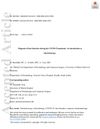 10 citations,
January 2010 in “International Journal of Trichology”
10 citations,
January 2010 in “International Journal of Trichology” Synthetic hair fibers for hair restoration were controversial in 2009 due to health risks and lack of support from the International Society of Hair Restoration.
 9 citations,
August 2017 in “Photochemistry and Photobiology”
9 citations,
August 2017 in “Photochemistry and Photobiology” Red light at 627 nm can safely trigger IL-4 release in skin cells, potentially helping treat inflammatory skin conditions.
[object Object]  8 citations,
August 2020 in “Experimental dermatology”
8 citations,
August 2020 in “Experimental dermatology” PRP therapy for alopecia shows inconsistent results due to natural variability in growth factor secretion by platelets.
 8 citations,
April 2017 in “Experimental Dermatology”
8 citations,
April 2017 in “Experimental Dermatology” More plasma leptin means higher baldness risk in men.
 8 citations,
March 2017 in “Experimental Dermatology”
8 citations,
March 2017 in “Experimental Dermatology” Finasteride helps female-pattern hair loss.
 7 citations,
August 2021 in “Journal of the European Academy of Dermatology and Venereology”
7 citations,
August 2021 in “Journal of the European Academy of Dermatology and Venereology” Early treatment of fibrosing alopecia in a pattern distribution may improve outcomes.
 7 citations,
November 2020 in “Experimental Dermatology”
7 citations,
November 2020 in “Experimental Dermatology” Different cell types work together to repair skin, and targeting them may improve healing and reduce scarring.
 7 citations,
July 2020 in “Pigment cell & melanoma research”
7 citations,
July 2020 in “Pigment cell & melanoma research” RT1640 treatment reverses gray hair and promotes hair growth in mice.
 7 citations,
June 2020 in “Journal of The European Academy of Dermatology and Venereology”
7 citations,
June 2020 in “Journal of The European Academy of Dermatology and Venereology” Genetic variants affect minoxidil hair loss treatment success.
 6 citations,
October 2020 in “Journal of the European Academy of Dermatology and Venereology”
6 citations,
October 2020 in “Journal of the European Academy of Dermatology and Venereology” Teletrichoscopy is a promising method for diagnosing hair disorders remotely during the COVID-19 pandemic.
 6 citations,
November 2007 in “Archives of Disease in Childhood: Education & Practice”
6 citations,
November 2007 in “Archives of Disease in Childhood: Education & Practice” The document concludes that accurate diagnosis of alopecia in children relies on thorough examination and history, and while treatments exist, none can alter the course of alopecia areata, which can significantly affect a child's psychological well-being.
 5 citations,
September 2020 in “Journal of Cosmetic Dermatology”
5 citations,
September 2020 in “Journal of Cosmetic Dermatology” Dexpanthenol improves hair growth and satisfaction in women without side effects.
[object Object]  5 citations,
June 2020 in “Experimental dermatology”
5 citations,
June 2020 in “Experimental dermatology” Redheaded people may have evolved to efficiently make vitamin D in areas with less sunlight.
 5 citations,
March 2019 in “Experimental dermatology”
5 citations,
March 2019 in “Experimental dermatology” Activating TLR3 may help produce retinoic acid, important for tissue regeneration.
 4 citations,
May 2019 in “Journal of The European Academy of Dermatology and Venereology”
4 citations,
May 2019 in “Journal of The European Academy of Dermatology and Venereology” Hair loss treatment caused more hair loss in a man.
 4 citations,
July 2017 in “British Journal of Dermatology”
4 citations,
July 2017 in “British Journal of Dermatology” The study identified the top 10 most important areas for future hair loss research.
 3 citations,
May 2020 in “Journal of The European Academy of Dermatology and Venereology”
3 citations,
May 2020 in “Journal of The European Academy of Dermatology and Venereology” Topical booster improves hair loss treatment effectiveness.
 3 citations,
April 2020 in “British Journal of Dermatology”
3 citations,
April 2020 in “British Journal of Dermatology” PRP treatment helps 70.1% of hair loss patients after two sessions.
 2 citations,
January 2020 in “International Journal of Cosmetic Science”
2 citations,
January 2020 in “International Journal of Cosmetic Science” Niacinamide does not promote hair growth.
 2 citations,
January 2020 in “Journal of The European Academy of Dermatology and Venereology”
2 citations,
January 2020 in “Journal of The European Academy of Dermatology and Venereology” Balding men have harder scalps.
 2 citations,
December 2019 in “Journal of The European Academy of Dermatology and Venereology”
2 citations,
December 2019 in “Journal of The European Academy of Dermatology and Venereology” Differences in gene expression and methylation patterns found in AGA patients suggest potential targets for future treatments.
 1 citations,
April 2020 in “Journal of The European Academy of Dermatology and Venereology”
1 citations,
April 2020 in “Journal of The European Academy of Dermatology and Venereology” Drugs like PDEI may help hair disorders like AGA.
 June 1930 in “Archives of dermatology”
June 1930 in “Archives of dermatology” Dermatological conditions are complex, and treatments have mixed results.
 August 2020 in “International Journal of Clinical Practice”
August 2020 in “International Journal of Clinical Practice” No link between hair loss and blood groups or Rhesus factor.
 129 citations,
January 2009 in “International Journal of Trichology”
129 citations,
January 2009 in “International Journal of Trichology” Trichoscopy can diagnose female hair loss with high accuracy by looking for specific patterns in hair and scalp appearance.
 91 citations,
January 2009 in “International Journal of Trichology”
91 citations,
January 2009 in “International Journal of Trichology” Different hair evaluation methods have their own pros and cons, and using multiple methods together is best for accurate hair loss diagnosis and tracking.
 45 citations,
January 2010 in “International journal of trichology”
45 citations,
January 2010 in “International journal of trichology” Topical immunotherapy, especially with DPCP, is effective for treating severe alopecia areata.
 44 citations,
January 2010 in “International journal of trichology”
44 citations,
January 2010 in “International journal of trichology” Choosing the right shampoo for your hair type is crucial.
 41 citations,
July 2009 in “International Journal of Trichology”
41 citations,
July 2009 in “International Journal of Trichology” 58% of men aged 30-50 have hair loss, with severity increasing with age.
 21 citations,
January 2010 in “International Journal of Trichology”
21 citations,
January 2010 in “International Journal of Trichology” TrichoScan often makes mistakes and needs improvement for correct hair growth analysis.






























